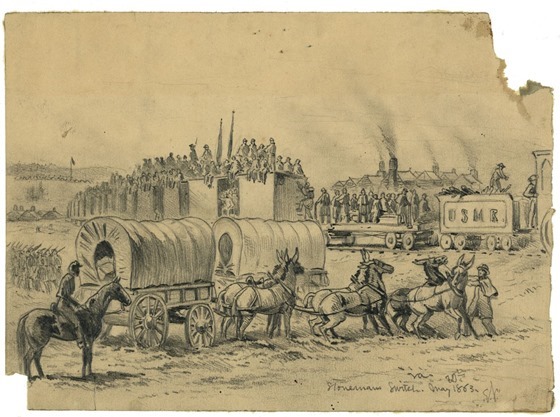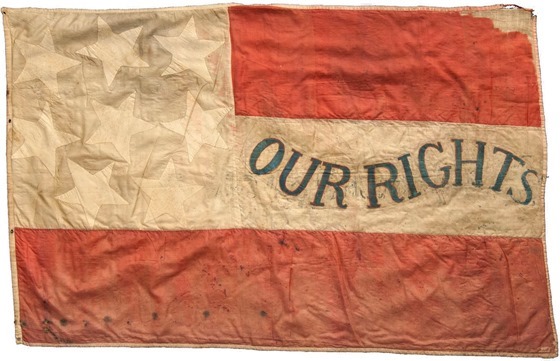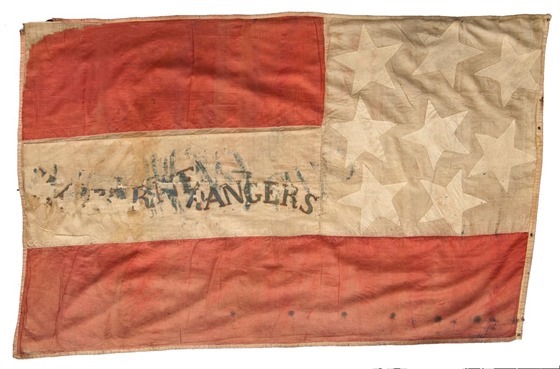Wednesday, 20th.—Heavy cannonading all day; sharpshooters very annoying indeed; keep up continual firing; our boys not allowed to return the fire on account of lack of ammunition. Companies A and F put in reserve battalion; pretty heavy firing along the river. About 7 P. M., Federals formed and fired one volley, raising the yell as though they were going to charge. Rebs responded with rifle and cannon, which made Yanks get back; loud cheers from the Rebs followed. Colonel Glenn wounded.
Monday, May 20, 2013
May 20th.—I feel depressed to-night. Army news from the South bad. General Pemberton has been repulsed between Jackson and Vicksburg. General Johnston is there; I hope, by the mercy of God, he may be able to keep the enemy out of Vicksburg. Besides the depressing news, the day has been distressing in the hospital—so much suffering among the wounded. One fine young man has the appearance and manner of imbecility, from having been struck on the head by a piece of shell. No relief can be given him, and the surgeons say that he must die.
Mr. —— staid in town to attend the Church “Council,” as it is now called. This new name may be more appropriate to an ecclesiastical meeting, yet “Virginia Convention” has a sweet, hallowed sound to me.
Departure of two-years men from the Army of the Potomac. A scene near Falmouth, Va. May 20, 1863; drawing by Edwin Forbes; Library of Congress image.
Camp White, West Virginia, [May 20 (?)], 1863.
Dear Uncle: — If I wrote you two or three days ago after getting your last, I take this one back; or let it go to my credit on future account. We are expecting to have our communications cut with the outside world soon again. We are tolerably fixed for it, and can worry through, if not too long continued.
We do not know accurately yet what has happened to Hooker. He is repulsed and his movement a failure. I hope he is left relatively as well off as he was before. If so, he is still, for all I see, our general. I can perceive nothing injurious to him personally in the failure. He has shown his disposition to do something, and, for all that appears, capacity. This is all we can demand. The radical vice is, as I have said to you before, I fear, in the army. Somebody behaves badly. This is always to be expected in all armies. But in this army it seems always to be at the vital point, where it is ruinous. I always feel when the Potomac Army moves, that if they are not routed, we are to be glad. So now, from present accounts, I feel happy that it is no worse. If our army under Hooker can keep employed the largest and best Rebel army, they are probably fulfilling their mission.
To do more than this, would speedily end the Rebellion. To do merely this, will end it in time.
Perhaps I better take stock in your bank. I could now pay one or two thousand cash, and by selling my Hamilton property, could increase it soon to five thousand dollars. What say you?
Sincerely,
R. B. Hayes.
S. BIRCHARD.
May 20th. We remained here until this date having the finest of times, when orders were received to pack up and report to the regiment at Fort Marshall. Orders having been received for the regiment to report to General Robert H. Milroy at Winchester, Virginia.
Wednesday, 20th — This morning found us going up the river, when about 10 o’clock we landed three miles below Vicksburg. The rebels commenced throwing shells our way and we dropped down the river to a point six miles below the city. But at 4 o’clock we returned to the place we had reached in the morning, and landing on the west bank marched across the point of land just opposite Vicksburg. Here we boarded the boats again and awaited orders. The mortar boats are throwing shells into the town. Our armies about Vicksburg have taken a great many prisoners. It is reported that our men have taken Haines’s Bluff, and that General Grant has commenced action all the way around his line of battle.
May 20.—Last evening a friend sent me word that my brother was in the Gilmer Hospital. (It is now on the same hill as the Academy). I went there immediately, and was glad to find that he had not much the matter with him. He has a carbuncle on his arm, caused by bad food. A change of air and diet would, I feel certain, benefit him more than any thing else.
I staid all night with Mrs. Gorman, the matron of the hospital; it is a perfect treat to visit there. The hospital buildings are newly put up; they are composed of four or five two-story wards, each large enough for about fifty patients. Each ward has a small room attached to it, used as a distributing-room and pantry, and another, used as a bath-room. I went through Dr. Cannon’s ward. (Dr. Cannon is the same whom I met in Corinth.) Every thing about it was in perfect order. The bunks had on white comforts, not the least soiled, although they had been in use some time. The view from the upper part of these wards is perfectly entrancing; the trees are magnificent. I called Dr. Cannon’s attention to the scene, and asked him if there was any thing in England to equal it (he is an Englishman). He said he had seen nothing to surpass it, and that he considered the view from his window one of the finest in the world.
This morning, before leaving, I paid a visit to the Academy Hospital, which is but a short distance from the other. They both belong to General Polk’s corps. Both have been put up since we came to Chattanooga. The Academy has been finished some time. It is perfect in every department. The wards are but one story high, each holding about twenty-five patients. They have a small distributing room for every two of these wards. The food is brought from the kitchen to them, and distributed by a ward matron.
They have very few patients at present . The wards are fixed up very nicely, having been newly whitewashed, and Mrs. N. has them very tastefully dressed with evergreens. The attendants sleep in tents, some of which are fixed up as nicely as any house. I visited one belonging to the druggist’s wife, who is one of the matrons. There was a place dug in the ground about three feet deep, the sides bricked around, and floored with planks, on which was a carpet . It had a chimney and fire-place; the tent-cloth was put over all, and gutters around, to keep out the rain. A very nice lady has charge of the linen room. In this hospital the patients have their clothes washed as soon as they come in. The wash-house is a little ways from the rest of the hospital; in it are large boilers, built on brick, and an ironing-room, and a shed for drying the clothes in wet weather.
There is one great drawback which we all have: the water used has to be carried from the river in barrels. The wards are at least twenty yards apart. Mrs. N. tells me that Dr. Hawthorne, the surgeon, is one of the best managers she has ever been with; but I have been told one thing about him, that proves that he is not a humane man; I refer to his method of punishing the men by bucking and gagging; sometimes he puts a bayonet in their mouth instead of a stick, and ties it so tightly that the blood gushes out. Many a time he has made the men stay in this position twenty-four hours, giving them neither food nor water. I do not think there is any necessity for going to such extremes. We have as good discipline in our hospital as there is any need for, and nothing of that kind is ever resorted to.
On my way back this morning, I called on Mrs. Brewer, and had an introduction to Major-General McCown, who is now under arrest for disobedience of orders, or, as a lady the other day told me, for giving his men coffee! I found him very pleasant in conversation; he told us he had experienced nothing here in comparison with what he had endured in other campaigns. I think he had been in the regular army, and had been at Salt Lake, or on some expedition against the Indians.
May 20 — Moved camp again to-day, back to Dayton, from where we moved yesterday.
Confederate flag captured by the 4th Minnesota at the Battle of Jackson, Mississippi.
A newspaper correspondent says: “Captain L. B. Martin, of the 4th Minnesota, A. A. G. to Colonel Sanborn, seized the flag of the 59th Indiana Infantry, rode rapidly beyond the skirmishers (Company H of 4th Minnesota, Lieutenant George A. Clark), and raised it over the dome of the capitol. Lieutenant Donaldson of the 4th, also riding in advance, captured a flag made of silk; on one side was inscribed ‘Claiborne Rangers,’ and on the other ‘Our Rights.’ – Concise History of the State of Minnesota
Minnesota Historical Society image.
May 20, Wednesday. Admiral Lee has been here for two or three days consulting in regard to Wilmington. The blockade of Cape Fear is difficult and gives infinite trouble, but the War Department has manifested no desire to relieve us and prevent that means of Rebel communication. To-day we had a long conference. Lee has seen General Totten, and the conclusion is that the army must capture the place, assisted by the Navy, which will cover the landing. The practice of relying upon the Navy to do the principal fighting when forts or batteries are to be taken has had a bad effect in some respects and is vitiating the army.
Admiral Du Pont sends forward charges against Chief Engineer Stimers, who, on his passage from Charleston to New York after the late demonstration, expressed an opinion that Sumter might have been passed or taken. Du Pont requested Stimers to be sent to Port Royal for trial. Every officer under Du Pont has expressed a different opinion from Stimers and they would constitute the court. It is a strange request, and it would be quite as strange were I to comply with it. I would not trust Stimers, or any one whom Du Pont wished to make a victim, in his power. If not a little deranged, D. is a shrewd and selfish man. I think he is morbidly diseased. Drayton expresses this opinion. His conduct and influence have been unfortunate in many respects on his subordinates. Instead of sending Stimers to Port Royal to be sacrificed, I will order a court of inquiry at New York, where the facts may be elicited without prejudice or partiality. The alleged offense hardly justifies an inquiry in form, but nothing less will satisfy Du Pont, who wants a victim. More than this, he wants to lay his failure at Charleston on the ironclads, and with such a court as he would organise, and such witnesses as he has already trained, he would procure both Stimers and vessels to be condemned. It would be best for the ends of truth and justice to have an inquiry away from all partisanship, and from all unfair influences and management.












